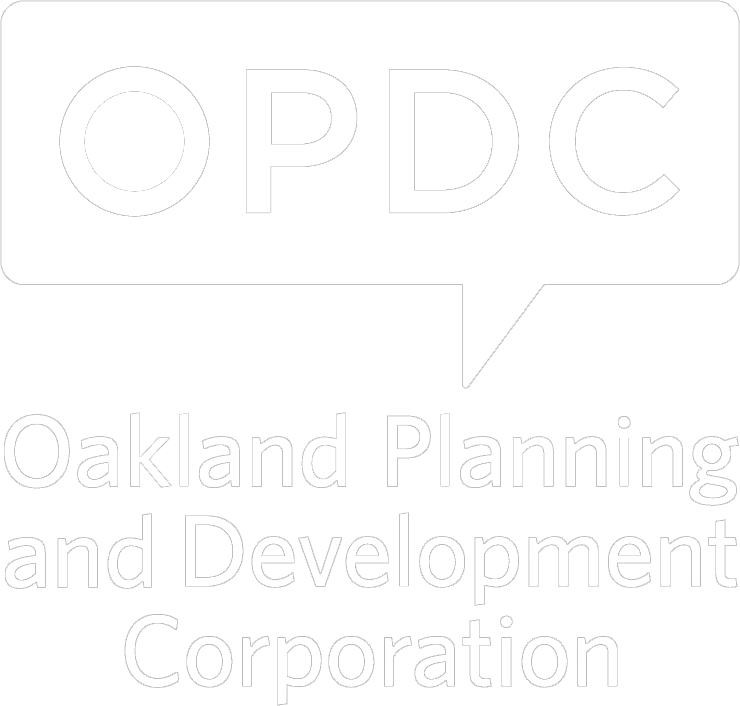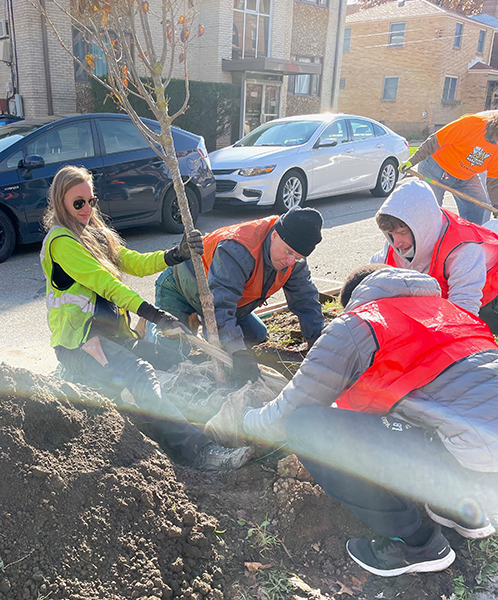Coming Back Together with Neighbors
Clutter for a Cause
Among the positive lessons we learned as we re-emerge from our online bubbles is the importance of a direct personal connection to our friends, colleagues, and neighbors.
Building, strengthening, and continually refreshing those connections takes enormous effort, especially when you’re out of practice. But that has made coming together for small and ordinary acts like picking up litter, tacking a flyer to a bulletin board, or making a phone call to a stranger all the more meaningful.
The community members we worked with over the past year grasped this intuitively, and we learned a lot from them. We feel a renewed sense of optimism and opportunity when it comes to our grassroots, placed-based neighborhood organization in Oakland, and we invite your continued engagement with us.
Let’s Talk: A Community Conversation
Let’s Talk meetings are interactive, resident-focused discussions featuring a monthly theme, presentations from community partners, and an open conversation.
Launched in summer 2021, Let’s Talk was born out of the idea that there are a wealth of issues affecting Oakland and that a topic-specific, community-focused space was needed for neighbors to speak up and be heard.
Eric Macadangdang, OPDC Board Secretary
“We wanted to engage with residents that had not previously come to OPDC
meetings, like meetings about development and neighborhood quality,” said Eric Macadangdang, OPDC Board Secretary, who helped to launch Let’s Talk. “We wanted to make sure we are looking for and valuing people’s perspectives on a wide variety of topics.”
Over the course of the year, we invited local experts to engage with the public on topics ranging from public health to air quality to the tree canopy.
“When you get out and talk to people, they have a diverse array of concerns, hopes, and dreams about what their neighborhood can be. Let’s Talk helps to break down the misconception that Oakland is one thing or idea. There are layers,” said Macadangdang.
Let’s Talk proved to be a vital tool when the Department of City Planning moved the Oakland Plan process online. The plan and zoning proposals were extremely complicated, and the community needed more opportunities to come together than the City provided.
Hundreds of you joined our Let’s Talk meetings on the plan and zoning proposals, our most well-attended of the year. Clearly, there was a need for more engagement, and the feedback we received was encouraging: attendees told us that we communicated in ways they could understand, keeping conversations on track while focusing attention where it mattered most for residents.
We will continue to engage with topics of interest to the community while also seeking to bring in neighbors who have not joined Let’s Talk in the past.
Oakwatch: The Oakland Code Enforcement Project
Oakwatch: The Oakland Code Enforcement Project works to improve the quality of life in Oakland by bringing people and institutions together to identify code violations, advocate for their remediation, and monitor the outcomes.
“We can connect with landlords. We can report 311 concerns,” said Liz Gray, Neighborhood Quality Consultant at OPDC. “There is a cause-and-effect relationship when it comes to enforcement, which is why we care about the rules.”
Liz Gray, Neighborhood Quality Consultant
Oakwatch has made a difference in our community for the past decade. We work closely with residents to understand the biggest concerns and prioritize those to enforcement agencies. Oakwatch continues to work pro-actively with city inspectors, property owners and renters, elected officials, and public safety officers to address quality of life issues and code violations throughout Oakland.
With the pandemic, fewer students in Oakland and fewer social gatherings meant fewer trash containment problems. Even so, we filed 902 tickets for 508 properties over the last year, including 16 properties with five or more tickets—almost all for refuse violations of various kinds.
“I've seen more residents and students reaching out regarding code issues and working with Oakwatch to move things forward to resolution,” said Gray. “The increased attendance by residents at housing court has made a big impact on proceedings.”
Oakwatch holds quarterly meetings on the third Wednesday of the month at 7:00 p.m. In between meetings, we provide monthly resources from partners in the community.
Mobilizing Volunteers for Oakland’s Streets
Last year, we transformed the Adopt-a-Block program from a monthly “volunteer and donut” hour into a more intentionally organized, team-based cleanup program. Under the new system, each team focuses on a specific block throughout the year as opposed to cleaning up various routes.
The hope was that students would have the chance to develop a real sense of ownership for the blocks where they live and provide consistent attention and feedback for us about neighborhood quality and safety issues.
We are pleased to report that this worked very well. Adopt-a-Block teams took pride in their routes—and achieved better results than past years.
Community Assistance intern Emelia Sargent led the charge, recruiting seven enthusiastic teams, delivering supplies, collecting waivers and reports, and coordinating pickup with the Department of Public Works. Across 28 events, 253 volunteers collected 105 bags of trash.
Student volunteers at the Garbage Olympics
Volunteers also pounded the pavement during the Garbage Olympics, a Pittsburgh-wide competition between neighborhoods to see who can get the most litter, debris, and garbage off our streets. We organized teams across Oakland neighborhoods, collecting 112 bags and two 5-gallon buckets of trash thanks to the efforts of 74 volunteers.
Clutter for a Cause is a collaborative program organized by OPDC and the University of Pittsburgh as a way to reduce students’ waste when moving in and out of their residences, whether they be on or off campus.
“Think about it in terms of scale,” said Community Programs Specialist Maura McCampbell, who has helped to organize past Clutter for a Cause events. “You’re packing up your room. You have two to three boxes of things you will not take home with you. Now, multiply those three boxes by 10,000. That’s what’s being sent to the landfill every year and what we’re trying to save.”
Putting Down Roots in Oakland
The threat to Oakland’s tree canopy made it into the Oakland Plan, and for good reason—well-supported trees reduce the risk of heat islands, improve air quality, and lift spirits with their natural beauty. Unfortunately, new development continues to put Oakland’s tree canopy at risk.
Fall planting
This past year, OPDC, TreeVitalize Pittsburgh, and the University of Pittsburgh joined forces for fall and spring tree plantings. Community Programs Specialist Maura McCampbell and a community forester conducted neighborhood walk-throughs to identify potential planting locations, OPDC reached out to property owners to invite participation, the Student Office of Sustainability at Pitt helped recruit volunteers, and everyone came together on planting day.
Many of our volunteer campaigns are aimed at students, but tree planting is an exception. The solidarity across all types of Oakland community members was apparent—53 volunteers, young and old, renters and homeowners, worked side-by-side to plant 32 trees, including lilacs, magnolias, and redbuds, around the neighborhood.
The next time you pass a tree in Oakland, give it a hug. It could be one that we planted!





